Vegetarian Keto Diet: Health Benefits, Food Lists, And Recipes
Learn what foods you should include in this low-carb diet plan to enjoy its benefits.
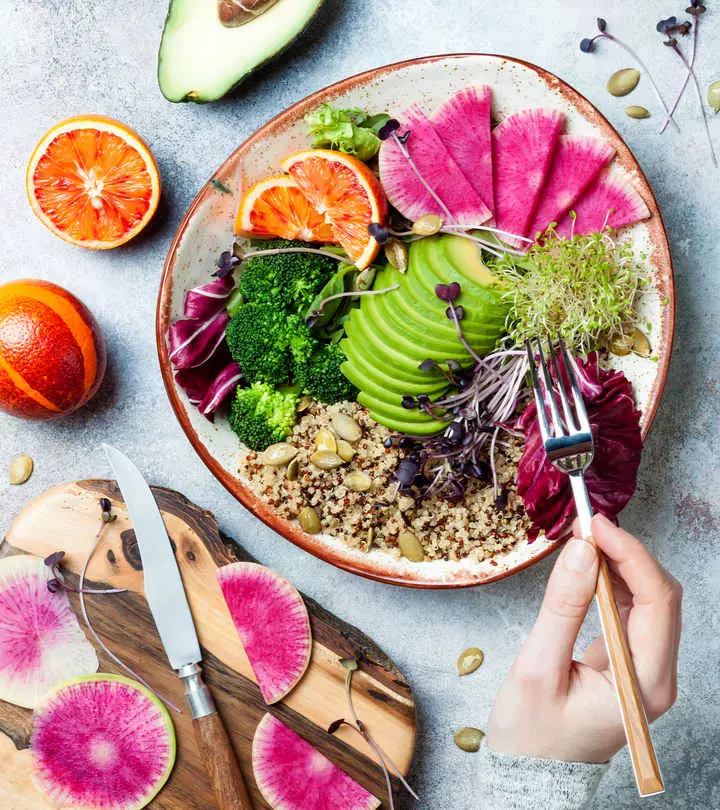
Image: Shutterstock
A vegetarian keto diet has many health benefits, including weight loss. This high-fat, low-carb diet involves consuming plant-based proteins in moderate quantities, high amounts of healthy fats, and negligible amounts of carbs. This shifts the body’s metabolic process to ketosis and burns more fat.A vegetarian ketogenic diet will help you shed some pounds and reduce the risk of obesity-related medical complications. Here’s everything you need to know about this diet – a foods list, meal plan, health benefits, and risks of following it for too long. Read on!
In This Article
What Is A Vegetarian Keto Diet All About?
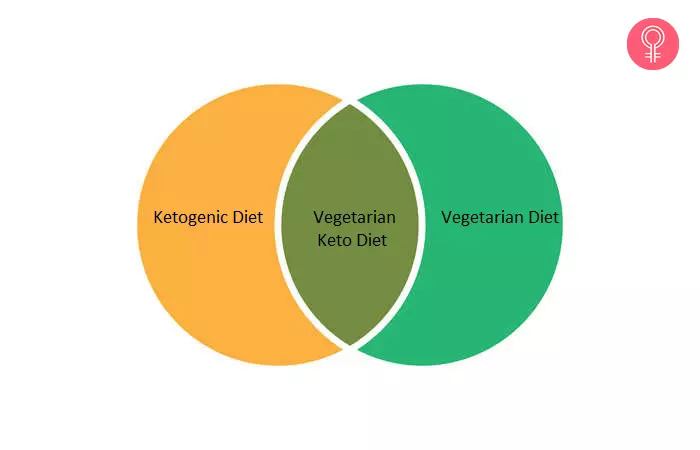
A vegetarian keto diet is a modified ketogenic diet without meat and eggs. This diet requires you to consume approximately 55%-60% fat, 30%-35% protein, and 5%-10% carbohydrates (1). But all the foods you consume are mainly from plant sources (except dairy). This slight customization helps include vegetarians in the keto diet club and enjoy the health benefits of the keto diet – weight loss being one of the most popular ones. You can check this ketogenic calculator to find your nutrition needs to reach your health or weight loss goals. But how can eating so much fat help you lose weight? Find out in the next section.
Key Takeaways
- A vegetarian keto diet is a modified ketogenic diet without meat and eggs and focuses on the consumption of meals high in healthy fats with moderate plant based protein intake and neglible quantities of carbohydrates.
- On this diet, you can only consume non-starchy vegetables and limited options in fruits.
- This diet has several benefits with weight loss being the most important one.
- As being on the keto diet in the long run may lead to mineral and vitamin deficiences and increase the risk of kidney stones and fatty liver, it is best to do it for a few months, take a break and resume after a while again.
How Does The Vegetarian Keto Diet Work?
When you are on a vegetarian keto diet, your body no longer uses sugar or carbs as the primary fuel source (1). It starts using ketones (hence the name) instead. When the carb supply is cut off, your body first switches to using the glycogen (a stored form of glucose), then lactic acid, glycerol, and protein. Finally, ketogenesis sets in.
This process breaks down fat into ketone bodies (excellent energy sources that are an alternative to glucose). The liver continues to produce ketone bodies as long as the carb intake is near to none. This state is known as “nutritional ketosis.”
Now that you know that this high-fat and low-carb diet actually works, here’s a sample menu plan. You can customize this menu according to your food habits.
| Did You Know? In 1921 Dr. Russel Wilder first used the keto diet to treat pediatric epilepsy. |
Sample Vegetarian Keto Diet Meal Plan
| Meals | What To Eat |
|---|---|
| Early Morning (7:00 – 7:30 a.m.) | 1 cup of bulletproof coffee |
| Breakfast (8:30 a.m.) | Low-carb avocado toast Or 2 keto coconut pancakes |
| Snack (11:00 a.m.) | 2 pistachio keto fat bombs |
| Lunch (12:30 – 1:30 p.m. ) | 1 cup of broccoli and cottage cheese/tofu salad Or 1 cup of stir-fried cauliflower rice |
| Evening Snack (4:30 p.m.) | Low-carb zucchini fritters Or 1-2 peanut butter cups |
| Dinner (7:00 p.m.) | 2 halves of cheesy mushroom-stuffed bell pepper Or 1 cup of cream of spinach soup |
Apart from the foods mentioned in the sample diet chart, here’s a list of vegetarian keto-friendly foods you can add to your shopping bag. Scroll down.
Vegetarian Keto Diet Foods List
- Non-Starchy Vegetables: Broccoli, cauliflower, zucchini, spinach, arugula, asparagus, bell pepper, and kale.
- Fats: Olive oil, avocado oil, MCT oil, coconut oil, peanuts, peanut butter, almonds, almond butter, pistachios, pecans, hazelnuts, macadamia, walnut, cashews, Brazil nuts, coconut, chia seeds, flax seeds, butter, ghee, and cheese.
- Proteins: Tofu, cottage cheese, mushrooms, eggs (if you eat eggs), lentils and beans in moderate amounts, and keto-friendly vegetarian protein powders (pea, whey, soy, and hemp proteins).
These are the main food groups you should include in your diet. But humans are all about their habits. So, for beginners, here’s a gentle reminder of the high-carb foods to avoid when switching to keto. Scroll down.
High-Carb Foods To Avoid
Take these off your shopping list for as long as you are going to be on a vegetarian keto diet:
Potato, beetroot, yam, corn, sweet potato, cassava, rice, brown rice, quinoa, buckwheat, cereal, legumes, beans, white and wheat breads, pasta, couscous, wheat and refined flours, mango, banana, apples, orange, pineapple, watermelon, grapes, grapefruit, plum, pear, pretzels, bagels, doughnuts, all packaged foods, bottled sauces, candies, cookies, cakes, soda, and soft drinks.
Your vegetarian keto grocery list is ready. The next step is to start being on this diet. Learn how to get started in the next section.
How To Start A Vegetarian Keto Diet?
The first step is always the hardest. But not anymore. Here’s a complete plan to prep and help you start the vegetarian keto diet ASAP:
- First, talk to a licensed nutritionist/dietitian to know if going on a keto diet will benefit you. Your dietitian will analyze your food habits, lifestyle, medical history, and current medications before giving you the go ahead.
- Buy the foods you need and like to sustain the keto diet.
- Search for places that serve keto-friendly foods in case you decide to eat out or order in.
- Talk to your friend who is on the keto diet wagon for tips on foods and recipes.
- Follow vegetarian keto blogs and vlogs.
- Join a vegetarian keto diet group to stay motivated.
- Donate all high-carb foods to a shelter. Out of sight, out of mind!
- Avoid going to the processed food aisle in the supermarket.
- Start any day but start with a good dose of bulletproof coffee (tastes great!) to get your vegetarian keto journey going every single day.
With these starter points in mind, let’s now delve deep into the health benefits of the vegetarian keto diet.
Research-Based Health Benefits Of Vegetarian Keto Diet
- It can help reduce weight (1).
- It may prevent diabetes and can be used as a diabetes diet (2).
- It reduces the risk of cardiovascular diseases (1).
- It has shown promising results in treating epilepsy, ALS, and dementia (1).
- It may reduce the progression of some types of cancer (3).
- It reduces the risk of respiratory diseases (3).
- It may help reverse retinopathy (loss of vision) and kidney disease (4).
- It reduces recovery time and enhances a sense of well-being in athletes (5).
- It helps regulate blood pressure(1).
- It may help reduce acne (3).
Aishwarya Anand, a blogger, shared her experience with a vegetarian keto diet. She wrote about her progress after following the diet religiously for a month. She mentioned, “Although the first couple of days were hard, at the end of it I felt fresher and more energized. There was a visible glow on my face and I was more motivated to work (i).”
Undoubtedly, the ketogenic diet is reputed to have many health benefits. Adding to it, the vegetarian keto diet discourages meat intake, which has its own advantages. But does excluding other vegetables, fruits, legumes and beans, and whole grains impact your overall health? Let’s find out what happens to your body when you exclude other foods for a long time. Scroll down.
The Not-So-Good Side Of A Vegetarian Keto Diet
Vegetarian keto diet may cause (1)
- Keto flu. The symptoms are insomnia, nausea, headache, fatigue, vomiting, constipation, dizziness, and difficulty in exercise tolerance. However, this condition is usually short-lived (may last from 2 days to 2 weeks).
- Vitamin and mineral deficiencies (these can be avoided if the diet is well-designed)
 Pro Tip
Pro TipThankfully, you can reduce the risk of the disadvantages of the vegetarian keto diet. Here are some effective ways.
Ways To Prevent Nutritional Deficiency
The best ways to prevent nutritional deficiency is to:
- Take vitamins and mineral supplements.
- Consume keto-friendly vegetarian protein drinks.
- Practice keto cycling. Follow a keto diet for a month or two and then take a break. Consume a high-protein diet (including legumes and beans) and healthy carbs like vegetables, fruits, and whole grains for 2-3 weeks.
With so much in your vegetarian keto diet knowledge bank, there’s one thing that can make sustaining keto quite tough. And that is knowing to cook vegetarian keto recipes. Here are three recipes that will get you started. Take a look.
3 Yummy Vegetarian Keto Recipes
1. Bulletproof Coffee

Ingredients
- 1 cup of brewed coffee
- 1-2 tablespoons of MCT oil (1 teaspoon for beginners)
- 1-2 tablespoons of unsalted butter or 1-2 teaspoons of ghee
How To Prepare
- Add all the ingredients to a blender.
- Blitz for 30 seconds, and it’s done!
- Sip away the buttery, tasty coffee to supercharge your body.
 Did You Know?
Did You Know?2. Broccoli Cottage Cheese Salad
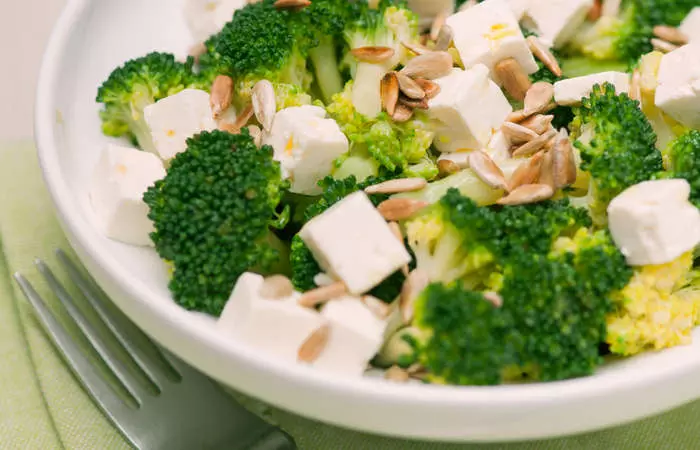
Ingredients
- ½ cup of cubed cottage cheese
- ½ cup of broccoli florets
- 1-2 teaspoons of sunflower seeds or pepita
- 1 dollop of butter
- Salt and pepper to taste
- A dash of olive oil
How To Prepare
- Boil two cups of water with a teaspoon of salt. Add the broccoli and boil for exactly two minutes.
- In a bowl, add two cups of water and four to five ice cubes.
- Scoop out the broccoli florets and place them in the ice water for a minute and transfer to another bowl.
- Heat a pan, add a dollop of butter, cook the cubed cottage cheese for two minutes.
- Add the cottage cheese to the bowl of broccoli.
- Add salt, pepper, and a dash of olive oil. Toss well.
- Sprinkle sunflower seeds or pepita on top.
3. Cheesy Mushroom Stuffed Bell Pepper
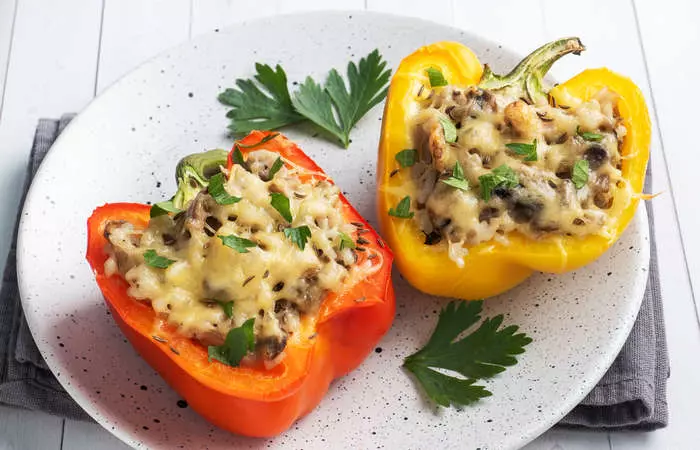
Ingredients
- ½ cup of chopped button mushrooms
- 1 bell pepper, halved
- 1 to 2 tablespoons of grated cheese
- Salt and pepper to taste
- 1 tablespoon of butter
- Finely chopped parsley
How To Prepare
- Heat a non-stick frying pan, add butter, and fry the mushrooms for a minute.
- Stuff the bell pepper halves with the mushrooms.
- Top them with salt, pepper, and grated cheese.
- Preheat the oven to 400°F.
- Put a baking sheet on a tray. Spray a little oil if you want.
- Bake the bell pepper halves for about 10 minutes.
- Take them out of the oven and sprinkle chopped parsley on top.
Yummm! Aren’t they? That’s the best part about the vegetarian keto diet. You can eat delicious food and lose weight! But one question remains to be answered – can you be on this diet if you have any medical complications? Find that out below.
Should You Try The Vegetarian Keto Diet?
The vegetarian ketogenic diet is for those who want to get all the benefits of the original keto diet, including weight loss and preventing obesity-related diseases (1). But to be on it, you must consult your doctor or dietitian.
Also, this diet depends on your food habits. Are you prepared to consume a high-fat, moderate-protein, low-carb diet for several months? Does it suit your lifestyle? If you cannot sustain this diet, you will not benefit from it.
If your doctor approves your decision to start going on a keto diet and you have answered “yes” to most of the questions above, you are perfect to start the vegetarian keto diet.
A vegetarian keto diet is a low-carb, high-fat diet without meat and eggs. It contains high amounts of healthy fats and proteins and low carb values. Non-starchy vegetables like broccoli, cauliflower, and spinach, healthy fats such as olive oil, avocado oil, peanuts, and cheese, and proteins such as tofu, eggs, and lentils are good for anyone following a vegetarian keto diet. Following this diet can help reduce weight, prevent diabetes, minimize the risk of cardiovascular and respiratory diseases, prevent the progression of some types of cancers, and regulate blood pressure levels. So, consult a dietitian and discuss this diet plan to get started and enjoy its benefits!
Frequently Asked Questions
Can you have yogurt on keto?
Yes. Plain yogurt is one of the dairy substitutes that can be consumed while on a ketogenic diet.
Is almond milk keto-friendly?
Yes. Due to its low carb content, unsweetened almond milk is a fantastic, keto-friendly choice.
Discover the intricacies of a vegan keto diet by watching the video below. Learn a few tried-and-tested nutritious recipes that can make a flavorful addition to your diet for a vegan keto lifestyle.
Personal Experience: Sources
StyleCraze's articles are interwoven with authentic personal narratives that provide depth and resonance to our content. Below are the sources of the personal accounts referenced in this article.
(i). Vegetarian Keto Diet — A Myth or a Reality?https://medium.com/@aishu.anand07/vegetarian-keto-diet-a-myth-or-a-reality-13edf4ef72ad
References
Articles on StyleCraze are backed by verified information from peer-reviewed and academic research papers, reputed organizations, research institutions, and medical associations to ensure accuracy and relevance. Read our editorial policy to learn more.
- Ketogenic Diet
https://www.ncbi.nlm.nih.gov/books/NBK499830/ - Advantages and Disadvantages of the Ketogenic Diet: A Review Article
https://www.ncbi.nlm.nih.gov/pmc/articles/PMC7480775/ - Beyond weight loss: a review of the therapeutic uses of very-low-carbohydrate (ketogenic) diets
https://idp.nature.com/authorize?response_type=cookie&client_id=grover&redirect_uri=https%3A%2F%2Fwww.nature.com%2Farticles%2Fejcn2013116 - Benefits of Ketogenic Diet for Management of Type Two Diabetes: A Review
https://obesity.imedpub.com/benefits-of-ketogenic-diet-for-management-of-type-two-diabetes-a-review.php?aid=14629 - Ketogenic diet benefits body composition and well-being but not performance in a pilot case study of New Zealand endurance athletes
https://jissn.biomedcentral.com/articles/10.1186/s12970-017-0180-0
Read full bio of Olga Afonsky
Read full bio of Ravi Teja Tadimalla
Read full bio of Sindhu Koganti






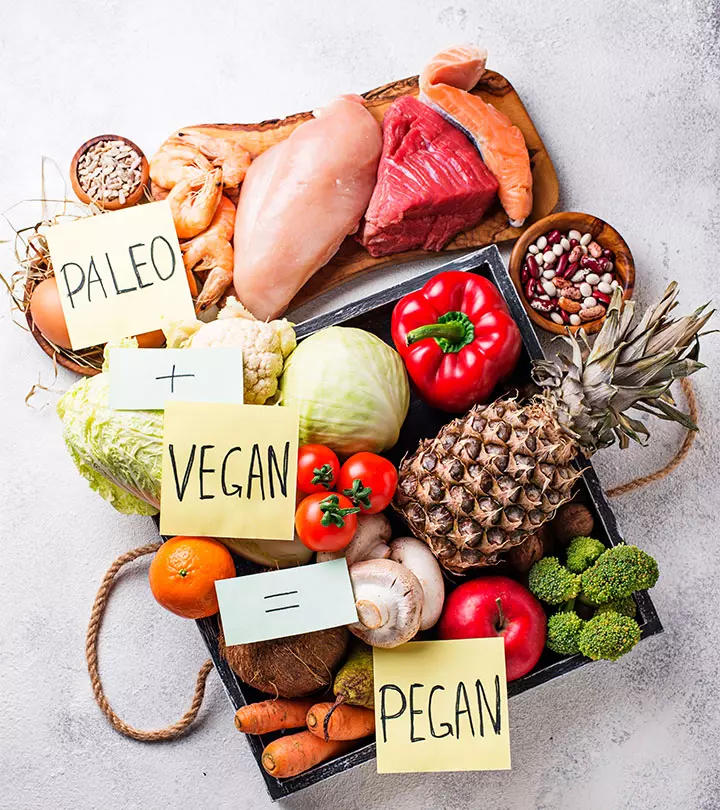
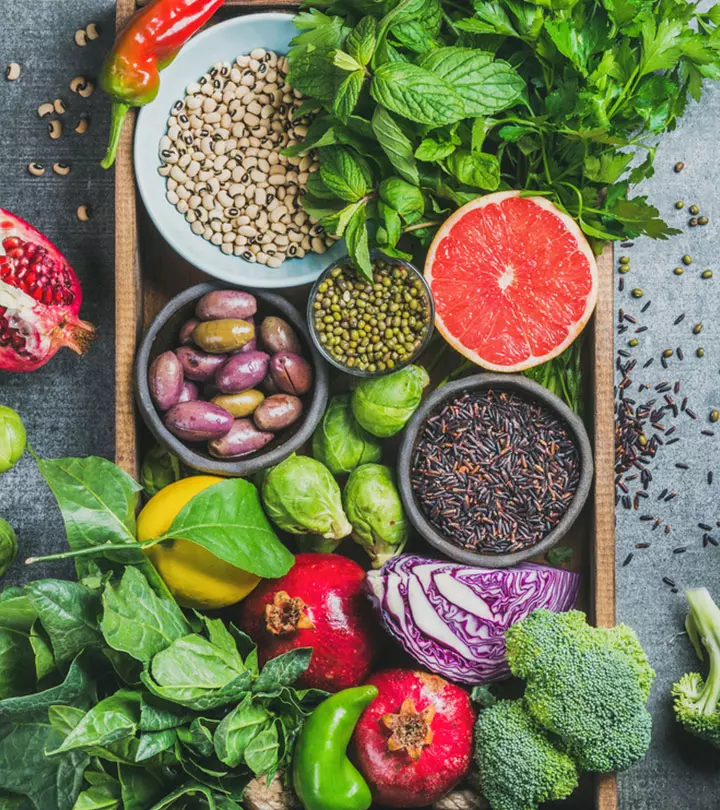

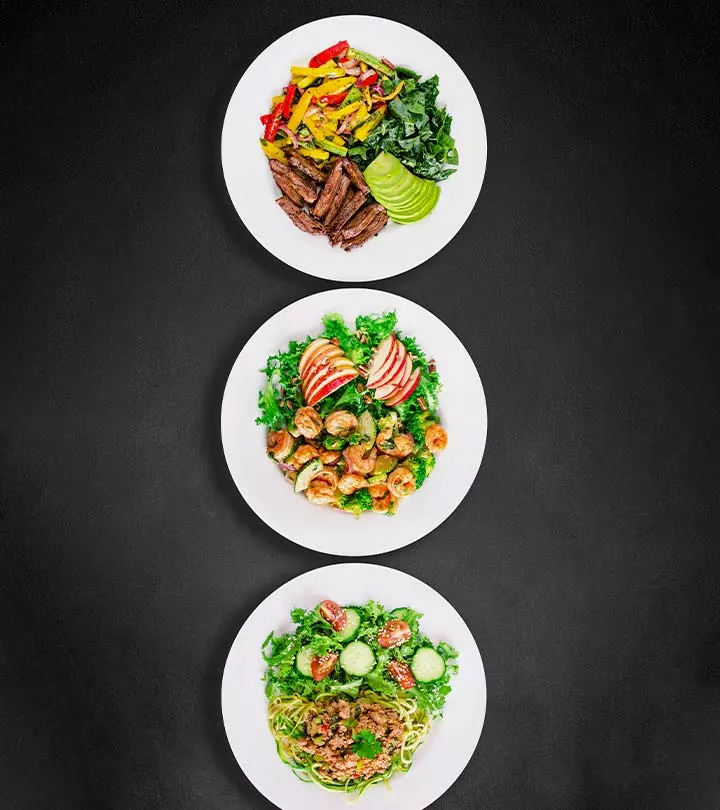

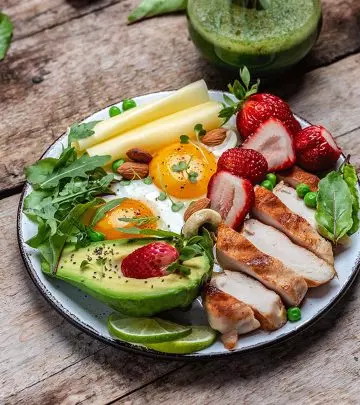
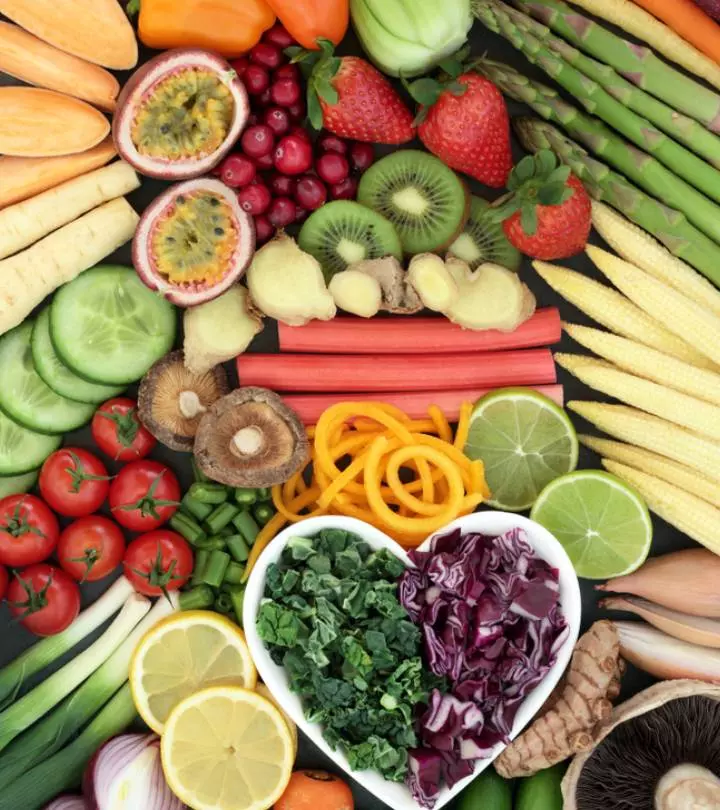
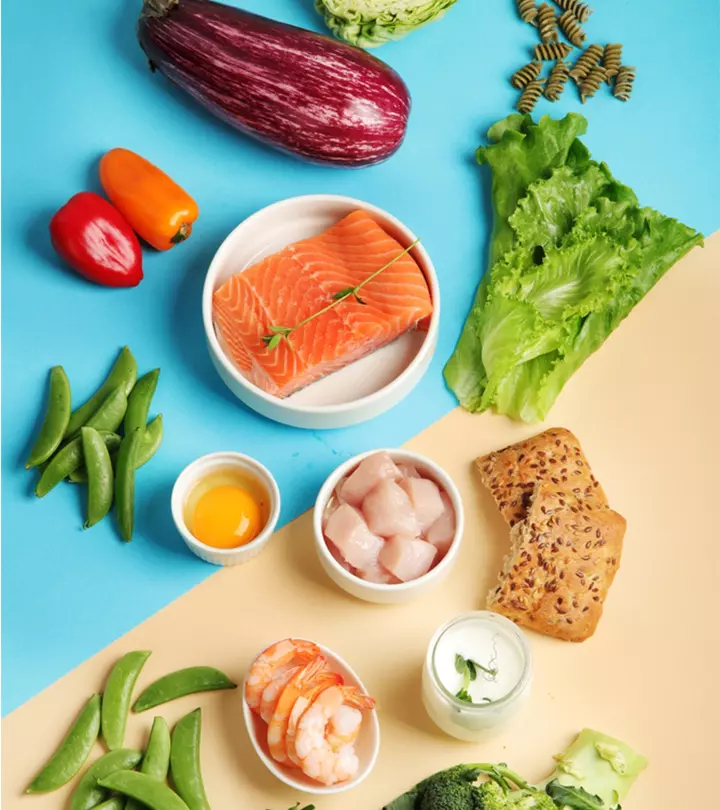
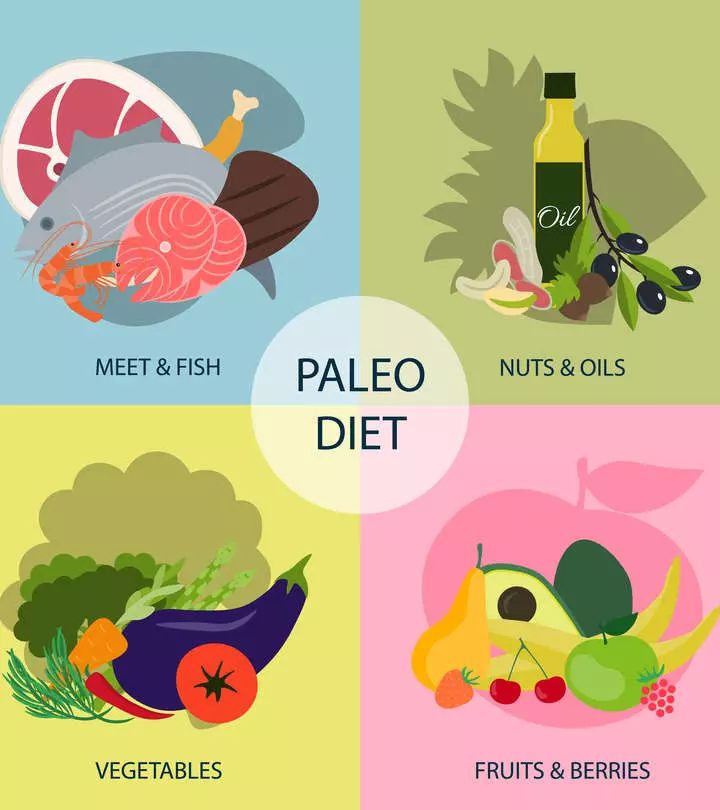

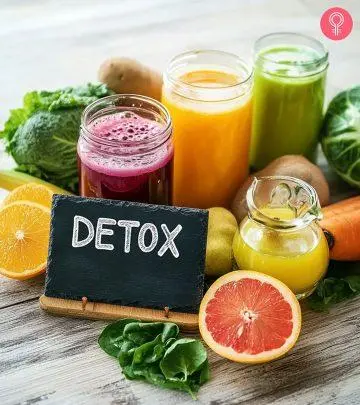
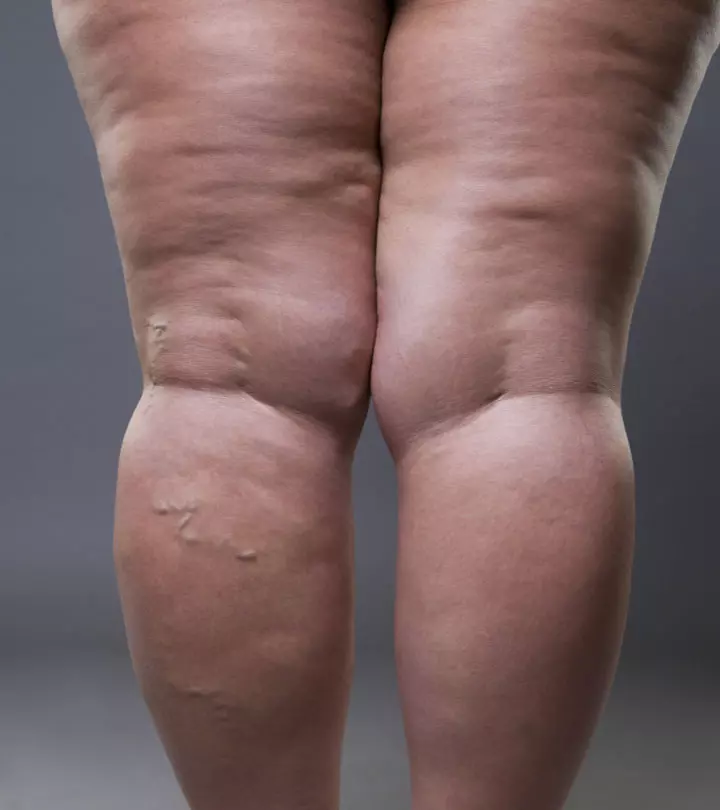
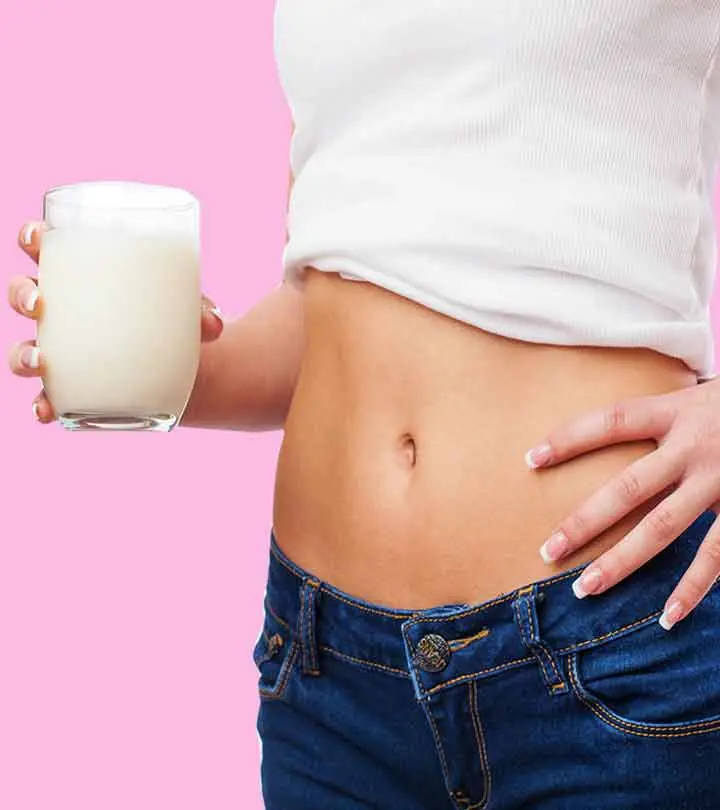







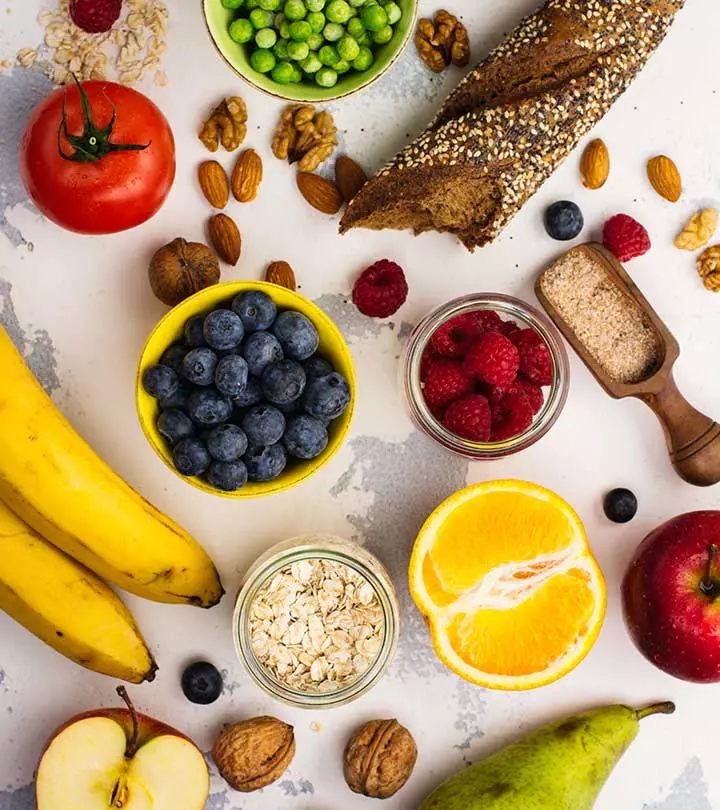
Community Experiences
Join the conversation and become a part of our empowering community! Share your stories, experiences, and insights to connect with other beauty, lifestyle, and health enthusiasts.